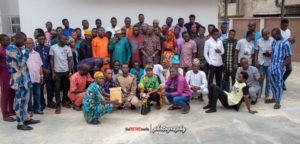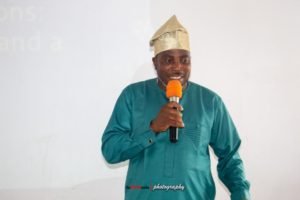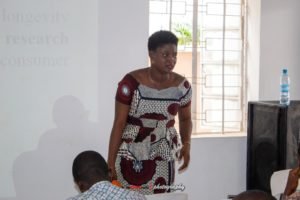We’re Not Taking Nigerian Garbages Into Yoruba Nation-Senator Akintoye
Leading agitator for freedom for Yoruba people and founder of Ilana Omo Oodua (IOO), Senator (Professor) Banji Akintoye, has said the Nigerian garbages, constituting a clog in the wheel of progress and development, will not be taken into the proposed Yoruba Nation.
He said this in his remarks at the closing ceremony of a 3-In-1 one-week advanced training on paint production, solar technology and robotics and smart homes automation, recently held in Ibadan, the Oyo State capital.
The training programme, tagged “Promoting Knowledge-Based Entrepreneurship in Yorubaland”, was organised by the Yoruba Professionals Foundation (YPF) and IOO, in partnership with WTL Technologies and Comfort Paints.
Represented by Prince Bisi Oyedeji, a retired permanent secretary, Senator Akintoye listed the Nigerian garbages to include rudderless and clueless leadership, stifled socio-economic and political growth, lopsided public appointments, abject poverty, unemployment, killings and lack of respect for the sanctity of human life.
He also admonished the Yoruba race not to be weary in the face of the pervading insecurity across the country, assuring that the Yoruba Nation would become a reality sooner than expected.
Congratulating the successful trainees, numbering about 100, Oyedeji said the training was an opportunity many other people would like to seize in the future, both to be self-independent and to help build the society.
“We shall soon get there and realised a country of our dream. We want the best for the Yoruba Nation. We are leaving behind the garbages of Nigeria. We don’t want to be faced in our Yoruba Nation with the myriads of problems confronting Nigeria.
“We want to be exporting our resources, both human and natural. The training should be useful to the trainees and the the Yoruba Nation. We are not importing the ugly things in Nigeria to the Yoruba Nation,” he said.
Prince Oyedeji also admonished the successful trainees not to lose focus on the end result of the training programme namely, for their individual benefit and for the benefit of Yorubaland.
“The training is a means to improve oneself, often because things change faster. Constant training is needed in order to increase skills, productivity and entrepreneurial activities.
“In the face of the economic challenges we are facing, university degrees are no more adequate. Training in skills will help you to improve upon your day-to-day socio-economic activities.
“The training has challenged your capability, resourcefulness and what we need in the Yoruba Nation. I just hope that you will not lose the end result which is very important to you all and our society,” he said.
Also speaking at a post-training seminar, Dr Samuel Fasanmi, a senior lecturer at the Federal University, Gusau, Yobe State, spoke on “Customers’ Relations Between The King And A Castle”.
He said what determines the success of the trainees after the programme is not really their creativity, but the way they relate with their customers.
Speaking in an interview at the sideline of the programme, Fasanmi said: “In the world we find ourselves, the customer is the king. The customer represents the king. There is nothing we want to sell, either product or service, that does not require the kingly treatment of customers.
“Customers determine the profitability or otherwise of whatsoever we do. This training centres on paint making, smartphone automation and solar system.
“Despite the fact that the participants have acquired prerequisite knowledge, it is very necessary for them to know that their relationship with customers will determine whether they are going to make a headway or not in the knowledge that they have gathered through this programme.
“That is why my discussion centres on how to treat customers, taking into consideration the concept of kingship in Yoruba culture where the customers are likened to kings and the environment is likened to castle.
“Also, we talked about the products, the services and the overall relationship among these elements of customer service relations.
“I am of the opinion that as they are done with the training today, Nigeria will be better for it, Yoruba Nation and the participants will be better for it because the training is just like a drop in the ocean which will begin to make a lot of ripples that will bring about economic, knowledge and entrepreneural revolution in Nigeria.”
Dr Fasanmi said personality affects service providers, noting that, as human beings, the people rendering services need to discover themselves, adding: “When that is done, we know that without winning ourselves, we cannot win others.
“We talked about the heredity factor, the environment, peer group and other things that we cannot change. We also talked about the attitude which is a major factor that determines the way we relate with our customers.
“We should work on our attitudes productively which would enable to gain more customers by winning their hearts.
“We also talked about how we can package our products to make them very attractive to our clients so that they will be unique. When we do that, I know that profit maximisation will not be a big deal,” he said.
Looking at the Nigerian situation, he said, “For every rule, there is an exception. Just like I said that you have to start small; when you start small, you would be able to conquer the environmental factor.
“For instance, most of the participants here don’t have the resources to start doing what they have learnt. But the truth is that, with resilience and determination, they will definitely survive.
“They have to start little. When you start little, it is easier for you to manage the situation you find yourself. But if you are waiting for government to do that for you, you might not be able to start anything.
“The truth is that most of what we have now in Nigeria, like what we are doing right now, I doubt if there is a government that has taken it into consideration. It is not in their plan.
“Since the organisers of this programme has deemed it fit to come with a robust package and also top it with customer relations, one can become independent almost immediately after leaving this training which is good for us.”
Mrs Folasade Adebayo, a market research and survey expert, spoke on “Market Research Approach And Development Strategies” and urged participants at the one-week training to endeavour to find out the basic needs of their potential customers before embarking upon any product or service.
Dr Tunde Hamzat, the secretary of Ilana Omo Oodua, spoke on human capacity in a paper titled “Understanding The Human Dynamics In The Workplace For Profitability, Sustainability and Efficiency”.
He also said the variables that can make or mar a business venture are too many to itemised but listed some to include finance, machines, fixed and non-fixed assets and the human factor.
Dr Hamzat said the human factor is the most complex in the task of building a successful business entrepreneur, either as a producer of products or as a service provider.
“You are trained to be employer of labour and not to be a liability. If you have access to huge amount of money but you don’t understand the human dynamics that drive the process, the project is dead on arrival,” he added.
Some of the trainees who spoke at the end of the programme expressed their appreciation for the opportunity they were given to be beneficiaries of the training programme and, on behalf of others, assured that they would put what they learnt into good use and for the benefit of the Yoruba Nation.





